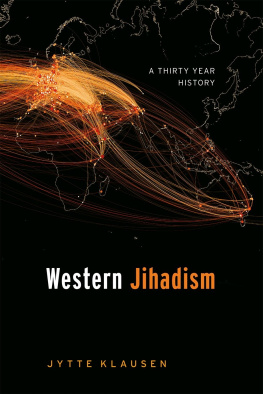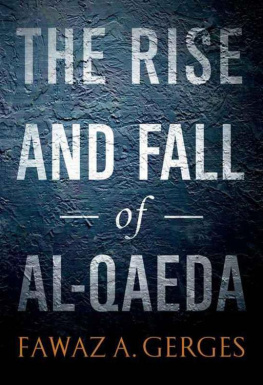WESTERN JIHADISM
In the teeming field of Al Qaeda studies Jytte Klausens book is a real gem; a full history of AQ that really explains why it has, and will continue to have, such staying power.
Its analysis is based on a 15-year terrorism data programme that is simply the best I have seen. Though it may be uncomfortable reading for those who prefer to believe that western society itself creates Al Qaeda terrorism, Klausens conclusions are impossible to dodge.
Michael Clarke, Professor of Defence Studies, University of Exeter, and Chairman, Countering Jihadism in the UK, 2016-20
Western Jihadism: A Thirty-Year History is a substantial contribution to the field and to an understanding of the depth of the terrorist networks and their linkages within the networks that remain a global threat today. Professor Klausens immense data collection and analysis will provide a basis for the study of Western Jihadism for decades to come.
Gale A Mattox, Professor of Political Science, U.S. Naval Academy
Klausens Western Jihadism: A Thirty-Year History not only helps connect the dots that were missed about al-Qaedas network leading up to the 9/11 attacks, but also then helps piece together the networks that re-emerged and were created in the attacks aftermath. Backed by an unprecedented database of all Western residents and citizens involved in the jihadi movement, Klausen clarifies many misconceptions and misunderstandings about al-Qaedas and later the Islamic States networks in the West and how they have evolved over the past thirty years. It will no doubt become an important resource for academics, practitioners, and policy-makers alike when trying to understand the phenomenon of jihadism in the West.
Aaron Zelin, author of Your Sons Are At Your Service: Tunisias Missionaries of Jihad

Great Clarendon Street, Oxford, ox 2 6 dp , United Kingdom
Oxford University Press is a department of the University of Oxford. It furthers the Universitys objective of excellence in research, scholarship, and education by publishing worldwide. Oxford is a registered trade mark of Oxford University Press in the UK and in certain other countries
Jytte Klausen 2021
The moral rights of the author have been asserted
First Edition published in 2021
Impression: 1
All rights reserved. No part of this publication may be reproduced, stored in a retrieval system, or transmitted, in any form or by any means, without the prior permission in writing of Oxford University Press, or as expressly permitted by law, by licence or under terms agreed with the appropriate reprographics rights organization. Enquiries concerning reproduction outside the scope of the above should be sent to the Rights Department, Oxford University Press, at the address above
You must not circulate this work in any other form and you must impose this same condition on any acquirer
Published in the United States of America by Oxford University Press
198 Madison Avenue, New York, NY 10016, United States of America
British Library Cataloguing in Publication Data
Data available
Library of Congress Control Number: 2020947222
ISBN 9780198870791
ebook ISBN 9780192643803
Printed and bound by
CPI Group (UK) Ltd, Croydon, cr 0 4 yy
Links to third party websites are provided by Oxford in good faith and for information only. Oxford disclaims any responsibility for the materials contained in any third party website referenced in this work.
This book is dedicated to the teams of Brandeis University students who have worked on this project with skill, commitment, and dedication.
Preface
Fifteen years ago, in a book also published by Oxford University Press, I challenged the Clash of Civilizations thesis promoted by Samuel P. Huntington, a Harvard professor, who argued that Muslims in the West are an indigestible minority, made incapable of integrating into a liberal democracy by their observance of religious law that precludes loyalty to a secular constitution. My research had demonstrated that, in fact, European Muslim civic leaders and elected politicians unequivocally supported the norms of democratic governance.
A few reviewers complained that I had ignored the obvious. Self-evidently, Islamists had declared war on the West in the name of Islam. Why did I write only about the good Muslims? Oddly, around the same time that the culture war over Islam in the West was building, government officials across Europe and in the United States were not particularly troubled by Islamist extremism. It did not represent an obvious, immediate challenge to domestic security. Osama Bin Laden was in hiding. There had been no serious terrorist acts in the West since the suicide bombings of the London Underground in 2005. Al Qaeda seemed beaten.
I thought both camps had it wrong. The resurgence of this violent apocalyptic fringe movement has little to do with religion or how Muslims living in Western democracies feel or think about their lives. Western Muslims are not generally alienated from the broader society. Al Qaeda would never recruit more than a tiny minority of Western citizens to its service. However, the global jihadist movement that Osama Bin Laden spearheaded continues to pose a danger to the domestic security of Western democracies and to the political and economic stability of countries with large Muslim populations in Africa and Asia.
The problem was that we just did not have good data for understanding the mechanics of how a global transnational terrorist organization was able to mobilize and grow on the scale that Al Qaeda and its affiliates have been able to do. Therefore, in 2006, working with my students, I began to collect the data needed to get to an evidence-based understanding of how Al Qaeda took hold in Western democracies. This book describes the results of my data gathering project and presents a novel picture of how Western jihadism developed. Riding a wave of globalization and mass migration, it was at once global and local, religious and political, fundamentalist in ideology, post-modern in its practice. And it is still there, stronger than ever.
Acknowledgments
This book has been a decade in the writing. The Western Jihadism Project, the online archive from which all the data used in this book derives, took even longer to build. Many students, colleagues and collaborators helped me to set up and maintain the data archive, and to prepare the book for publication. Over the years, generations of Brandeis University students have worked with me on research that in one way or another is the foundation for this book. This book is dedicated to them.
My deep thanks go to Rosanne Libretti, a dedicated collaborator and a skilled and tireless research assistant, who is responsible for the graphic of the global organization of Western jihadism that graces the cover of this book. Two of my students, Joseph Coles and Nick Yanco, helped push me over the goal line by mastering the reference management software used here to keep track of the many references and generate the bibliography. Special thanks are due to Annalyn Bachmann, Alexandra Johnson, Priyanka R. Renugopalakrishnan, Eliane Tschaen Barbieri, and Aaron Y. Zelin, who became collaborators and co-authors. Haliana Burhans, Selene Campion, Sam Chestna, Katherine Dowling, Zachary Herman, Daniel Mangoubi, Evan Maloney, and Yujiao Su began as student assistants and stayed on to work on the research for years, sometimes returning after graduation to do more work. Rima Farah helped with the translation of Bin Ladens personal journal from his difficult handwriting in Arabic. Siyi Cao, Alyssa Goncalves, Michael Nagler and Siting Ren built the online infrastructure for the data collection in a relational database management system that made it doable to coordinate qualitative and quantitative data.













